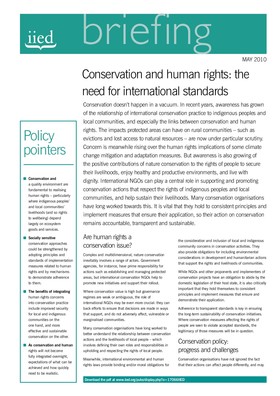Conservation and human rights: the need for international standards

Conservation doesn’t happen in a vacuum. In recent years, awareness has grown of the relationship of international conservation practice to indigenous peoples and local communities, and especially the links between conservation and human rights. The impacts protected areas can have on rural communities – such as evictions and lost access to natural resources – are now under particular scrutiny, and concern is rising over the human rights implications of some climate change mitigation and adaptation measures. But awareness is also growing of the positive contributions of nature conservation to the rights of people to secure their livelihoods, enjoy healthy and productive environments, and live with dignity. International NGOs can play a central role in supporting and promoting conservation actions that respect the rights of indigenous peoples and local communities, and help sustain their livelihoods. Many conservation organisations have long worked towards this. It is vital that they hold to consistent principles and implement measures that ensure their application, so their action on conservation remains accountable, transparent and sustainable.
Cite this publication
Available at https://www.iied.org/17066iied